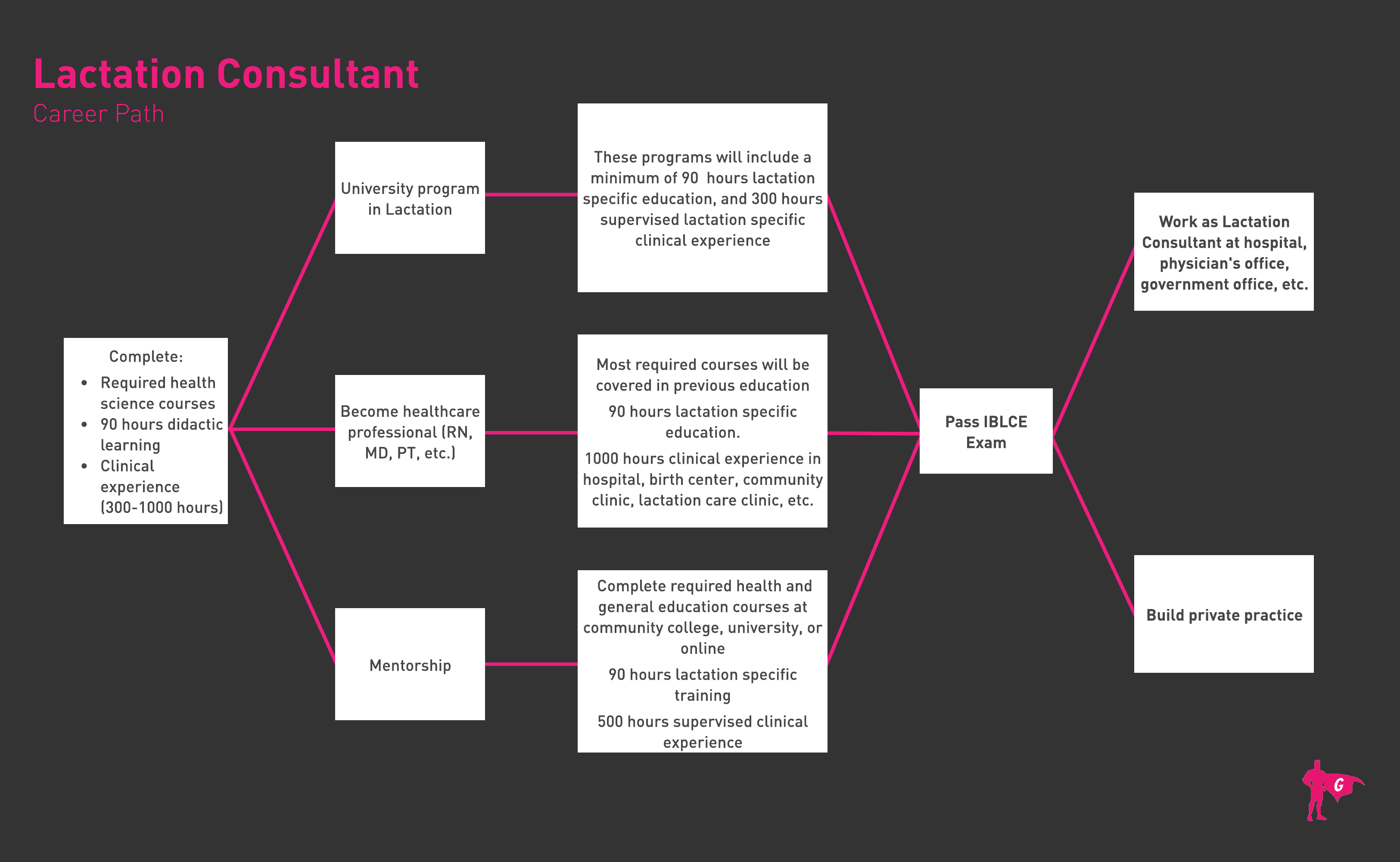스포트라이트
Breastfeeding Specialist, Lactation Specialist, Breastfeeding Counselor, Breastfeeding Educator, Infant Feeding Consultant, Maternal-Child Health Consultant, Breastfeeding Support Specialist, Lactation Educator, Certified Lactation Counselor, Infant Nutrition Consultant
Lactation consultants guide and support mothers through the breastfeeding process from preconception to weaning.
- You get to make a difference in women’s lives; helping them to establish bonds with their new babies and providing the babies with vital nutrients.
- Good work/life balance
- Satisfaction of solving breastfeeding problems
- Working with babies!
They show mothers how to position their babies and get them to latch correctly, and teach them about things like breast pumps or supplemental feeding options. They also help to ensure that the baby is getting enough milk and gaining enough weight. Lactation consultants often offer breastfeeding courses and seminars to parents.
When working in a hospital setting, the job may often require overnight shifts and odd hours. Consultants in the maternity ward may work for several days straight, followed by several days off. Working in a physician’s office often allows for a more predictable schedule.
- Necessary Skills
- Interpersonal Communication
- Accuracy/Attention to detail
- 인내심
- Teaching skills
- Listening
- Ability to motivate
- Ability to work with different people from different backgrounds
- Discipline
- Commitment
- Hospital - Maternity ward, NICU
- Physician office
- Government office
- Private practice
- Outreach programs
According to CDC, in the United States, 83.2% of new mothers begin breastfeeding their babies, and 57.6% continue for 6 months. Breastfeeding rates are on the rise, meaning that lactation consultant careers are as well.
- The term Lactation Consultant is sometimes confused with counselor jobs, which may be similar in some ways but feature unique distinctions
- Consulting is a higher level of credential than counseling
- There is no single education and training path for becoming a board-certified, Registered Lactation Consultant (RLC). Many students attend vocational/trade school programs or complete undergraduate-level certificates
- Some students earn a bachelor’s or master’s in nursing or health sciences, adding a Lactation Consultant certificate to their degree
- The Commission on Accreditation of Allied Health Programs (CAAHEP) accredits ~2,200 Lactation Consultant and health-related programs. Use their handy “Find a Program” tool to review options!
- Board certification may be obtained through the International Board of Lactation Consultant Examiners. Note, IBLCE is international and uses UK versus American spelling!
- IBLCE lists three educational pathways:
- Pathway 1: Recognized Health Professionals and Recognized Breastfeeding Support Counsellors
- Pathway 2: Accredited Lactation Academic Programmes
- Pathway 3: Mentorship with an IBLCE
- For those who desire IBLCE certification, unless they are current healthcare providers, they must finish courses in:
- Biology
- CPR
- Ethics
- Human anatomy and physiology
- Infant and child growth development
- Medical documentation and terminology
- Nutrition
- Occupational safety
- Psychology
- Research
- Safety precautions for infectious disease
- Sociology
- Lactation Consultants also must successfully complete 90 hours of lactation-specific education plus obtain 1,000 hours of experience with breastfeeding moms or 300 hours of supervised clinical practice prior to testing for certification
- IBLCE certification must be recertified through continuing education and testing
- Some states, like Rhode Island, New Mexico, and Georgia, also require licensure or registration to practice
- Some consultants may begin in counselor jobs. Lactation Counselor job titles include:
- Lactation Counselor
- Breastfeeding Counselor
- Certified Breastfeeding Counselor
- Certified Lactation Counselor
- Certified Lactation Educator
- Aspiring Lactation Consultants should decide early on which educational route they wish to take
- In high school, students can prepare by taking English, writing, public speaking, biology, anatomy, human physiology, business, and foreign languages
- It may be helpful to volunteer in healthcare settings, which can look great on college applications and resumes!
- Request to do informational interviews with working Lactation Consultants
- Talk to breastfeeding moms to learn about their experiences and difficulties
- Screen job ads in advance to see what types of qualifications employers are seeking the most
- Read Clinical Lactation and other peer-reviewed journals, in addition to popular mass publication magazines
- Scan through relevant FDA studies
- Participate in online breastfeeding support forums
- Watch videos about the different types of career opportunities in this field
- Consider if you want a job in a hospital, health clinic, private practice, home health agency, or community/workplace setting
- Get involved with professional organizations such as the US Lactation Consultant Association. Read articles, learn the terminology, and stay up-to-date on the latest developments
- Birthingway College of Midwifery
- UNC Gillings School of Global Public Health
- Drexel University
- Portland State University
- Union Institute and University
- University of California San Diego Extension
- But you can enter this career with any or no degree, as long as you complete the requirements and become certified!

1. Healthcare professional (registered nurse, registered dietician, medical doctor, physical therapist, etc.)
- Many lactation consultants were already healthcare professionals. These individuals must still complete 90 hours of lactation specific training and 1000 hours of clinical experience, although many of the hours they’ve already accumulated as a healthcare professional may count.
2. Graduate from a university program in lactation
- If you are choosing to go into a program specifically for lactation consulting, make sure that the program meets IBLCE requirements. It will provide all required courses as well as 90 hours of lactation-specific education and a total of 300 hours of supervised clinical experience.
3. Mentorship.
- With no previous experience or education, or a degree in an unrelated field, you can find an IBLCE mentor to supervise and guide you through your 500 total hours of clinical training. With this pathway, you will have to submit an application to IBLCE, follow their guidelines, and pay them a fee. Your mentor will devise a plan for you to meet the IBLCE requirements. You will still have to complete the educational portion separately.
- Because this option is not through an educational institution, scholarships and financial aid will not be available to you. Alternatively, look for small business loans and grants.
Time to put your skills to work.
- If you prefer working alone or for yourself: build a private practice. Build a network of clients and rely on referrals to get your name out there and establish a successful business. Offer your services to the community around you for starters.
- If you’d like to work at a hospital or clinic, begin applying for jobs. Some of these jobs may have additional requirements. Some hospitals prefer lactation consultants who are registered nurses, but don’t let this stop you if that isn’t your path. You can still obtain these jobs.
- There is always room for advancement. You can always further your education and undergo additional training to move up to managerial/leadership positions.
웹 사이트
- BabyandBump
- BabyCenter
- Clinical Lactation
- Commission on Accreditation of Allied Health Programs
- Dairy Queens Breastfeeding Support
- International Board of Lactation Consultant Examiners
- La Leche League International Breastfeeding Support Facebook Group
- MadeforMums
- Mothering
- The Bump’s Breastfeeding Message Board
- US Lactation Consultant Association
도서
- Counseling the Nursing Mother: A Lactation Consultant’s Guide: A Lactation Consultant’s Guide, by Judith Lauwers and Anna Swisher
- Paperless Private Practice for Lactation Consultants: A Complete Guide to Maximizing Technology for Efficiency, Productivity, and HIPAA Compliance, by Annie Frisbie IBCLC MA
- The Lactation Consultant in Private Practice: The ABCs of Getting Started: The ABCs of Getting Started, by Linda J. Smith
“Many employers look for lactation consultants who are also registered nurses. If you have any interest in nursing, this may be a good path for you.”
“You need to have passion and an ability to market yourself.”
뉴스피드

주요 채용 정보

온라인 강좌 및 도구







